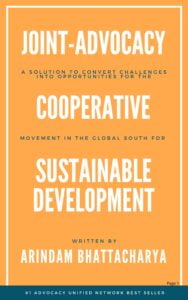|
AUN's Joint Advocacy for Corporatives

Methodological note for Joint Advocacy
The study is planned into three parts, through which the scope of Joint Advocacy will be evaluated. The first part constitutes of evidence-based research and analysis of the challenges faced by cooperatives of the global south and an overview of the recommendations for overcoming those challenges, which forms this initial report in a summarized manner. Second part of the study will comprise sector-wise research laying emphasis on the financial sector or cooperative banking. Finally, the third part will be covering the sectors capable of competing in the open market with a competitive approach.
This first part was initiated in November 2021 and includes the analysis of publications, sustainability reports, and interviews with the representatives of different cooperatives from Latin America, Africa, and Asia. It also included discussions with some members of the ILO Social and Solidarity Economy and the ICA. Some insights were also gained from the discussions that took place at the World Cooperative Congress on 30th November 2021 in Seoul, South Korea.
Advocacy Unified Network – AUN’s volunteers gathered information and data available from the cooperative’s websites. Wherever available, they consulted the latest annual and financial reports and extracted the available data for analysis. In addition, AUN formulated a questionnaire in English, French, Portuguese, and Spanish to take individual feedback from representatives of 18 different cooperatives from the Global South through semi-structured interviews.
The interview questions included how they contribute, report, and communicate sustainable development and expectations for future directions based on their understanding and communication. The objective was also to explore how the cooperatives of the Global South contribute to the SDGs and report and communicate on them, as well as learn what they expect from AUN for future strategic priorities. Provided the time constraints for this study, a snapshot for 2019-2021 is taken into consideration. The legal status of the institution was given utmost importance.
Background
The year 2012 was declared as the International Year of Cooperatives (IYC) by the United Nations General Assembly on the theme “Cooperative enterprises build a better world,” recognizing the contribution of cooperatives in socio‐economic development, identifying their role in poverty reduction, employment generation, and offering opportunities of social integration.
Through its resolution A/RES/64/136, the United Nations encouraged all Member States and relevant stakeholders to take advantage of the IYC to promote cooperatives and raise awareness of their contribution to social and economic development and promote the formation and growth of cooperatives. The three main goals for the International Year of Cooperatives were:
However, little is known about the International Organizations’ actual policies and program
Increase public awareness about cooperatives and their contributions to socio-economic development and the achievement of the Millennium Development Goals
Promote the establishment and growth of cooperatives
Encourage Governments to establish policies, laws, and regulations conducive to the establishment, growth, and stability of cooperatives, International Organizations (IOs), especially development agencies, have a vital role to play in providing support for the development of cooperatives through technical assistance and other development aid instruments.
for developing cooperatives in recipient countries, for instance, regarding the promotion, formation, and development of cooperatives in agricultural, service, and financial sectors. Cooperatives in Global South, in particular, need enabling environments in order to be competitive and sustainable and be given access to trade opportunities. This short article takes the first step in highlighting this gap and provides references to the IO’s current support for the development of cooperatives in the Global South.
To read the entire article, you can download our free E-book:
join AUN
Join AUN to transform the world
Contact Us
For any help reach us

